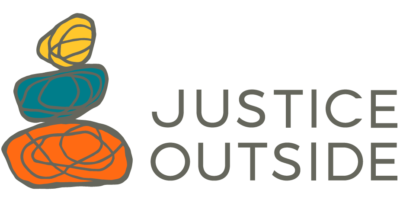“Nature as medicine” is not a new or novel idea for Black, Indigenous, and People of Color. Communities of Color have been turning to nature for mental and physical healing since time immemorial. Not only do communities around the world use a variety of herbs and practices to address physical pain and injury, but there have also always been remedies for heartbreak, grief, depression, anxiety, and more in Indigenous, Black, and Communities of Color.
Mainstream conversations and medical recommendations about the nature-mental health connection are incomplete when they do not draw from the leadership of Black, Indigenous, and People of Color. Our communities don’t always benefit from a “one size fits all” model where recreation leaders take folks who may have experienced trauma and set them up in an environment that does not address their unique needs at that moment in their lives. For example, a backcountry trip that isolates a survivor from their community can often have harmful impacts, rather than the healing benefits that folks assume will occur by simply being outside. Another misconception is that the connection to nature has to be extreme, remote, or prolonged. However, research shows that even five minutes of outdoor time in a green space or time spent in the company of plants can have positive mental health benefits.
Through Justice Outside’s grantmaking and other programs, we’ve had the privilege of partnering with many organizations working at this intersection of mental health and the outdoors. Movimiento uses a variety of programs, including Outdoor Wellness Adventures to integrate nature with mental health healing. Dr. Nooshin Razani at the Center for Nature and Health has used time in nature as a prescription for mental health for years, with the understanding that access to nature is impacted by race, gender, and class and is an equity issue. The Gateway Mountain Center is another great organization using nature-based learning, wellness adventures, and other non-traditional therapeutic approaches to mental health. Black Lives Matter-Phoenix Metro centers communal healing through meditation, art, nature appreciation, and more. The Southern Arizona Gender Alliance supports efforts like a soccer camp for queer and trans youth. UndocuHealth facilitates programs for healing and connectivity for undocumented communities.
It’s important to remember that for many Communities of Color, healing in and from nature doesn’t always mean backpacking in the woods or going for a hike. Rather, it can mean gathering with family in a park to defy the isolation that’s been enforced by the ripping apart of our communities through forced migration, colonialism, and war. It can mean community rituals for young people as they enter adulthood. It can mean farming or foraging. Many outdoor activities by Communities of Color take an intersectional approach to being outdoors and healing; they center communal healing; spaces where our identities are affirmed and where knowledge is passed down. Not only is it important to understand, value, and integrate these varied definitions of being in the outdoors and connecting with nature, but it’s also essential to invest in removing barriers to access. Over-policing and surveillance of Black and Brown communities, poverty and lack of time, lack of access to outdoor education and recreation programs are some of the obstacles to all of us benefiting from the outdoors. That’s why Justice Outside works not only to end systemic racism in the outdoors and environmental movements but also to elevate People of Color as leaders in these spaces.
Our work at Justice Outside is centered on the belief that Communities of Color are best positioned to understand our needs and to bring our joy into larger spaces. Indigenous, Black, and Communities of Color have been connected to the land, waters, and ocean since time immemorial, and our leadership has been ever-present. Throughout history, this leadership has either been erased, ignored or forgotten. It’s past time that our voices are once again centered as we face mental health crises, climate change, and more. We are the ones who are best positioned to find solutions for our communities, and for the global community at large. Healing starts with us.

